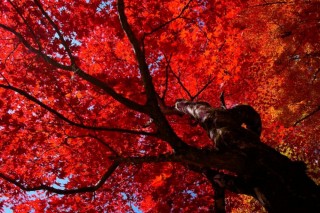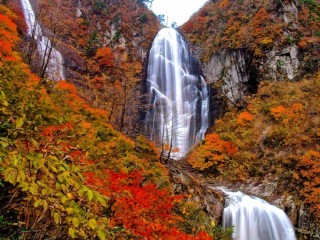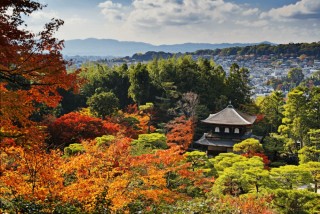Loading
Search
▼ Autumn Colors: A Guide to Visiting Japan in Fall
- Category:Autumnal tints
Autumn is a wonderful time to be in Japan. In my book, fall in Japan outshines spring (and cherry blossom season) for its many delights.
For one, the falling temperatures signal the return of comforting fall flavours. Think chestnuts and freshly harvested rice, fragrant pine mushroom broth, oily grilled Pacific mackerel, pumpkin soup, and sweet persimmons. (Hungry? Read more about Japanese cuisine.)
Autumn also brings orange osmanthus, blood-red spider lilies, and chrysanthemums in their delicate pastel glory. And after the heat and humidity of summer, a dip in the onsen (hot springs) suddenly becomes a warming respite from the bracing chill of autumn air.
Of course, one of the best parts of fall in Japan is the colours. Naturally, this means engaging in the ultimate autumn pastime — momiji-gari (also known as koyo).
Momiji-gari literally means “hunting red leaves,” which is the main draw for many visitors to Japan in autumn. It derives from momiji (red leaves, or maple tree), and kari (hunting). In practice, momiji-gari and koyo do not refer exclusively to maple leaves. Rather, they’re catch-all terms for “leaf peeping,” or viewing the fall colours. Think entire mountains enveloped in swathes of red, orange, and gold; an avenue of golden ginkgo trees leading to a shrine; starry red and yellow maple leaves blanketing a carpet of moss.
Because of how beautiful Japan is at this time of year — not to mention the relatively pleasant temperatures — fall has become a peak travel season in Japan. The good news is that, despite its popularity, the crowds in autumn haven’t quite reached the heights of those during sakura (cherry blossom) season. As such, if your dates are totally flexible and you have to choose one or the other, you may want to lean toward fall. On the other hand, it’s also worth considering another month or season altogether, as Japan is worth visiting at any time of year. If you’re not sure when to visit, see our guide on the seasons and best times of year to travel to Japan.
For one, the falling temperatures signal the return of comforting fall flavours. Think chestnuts and freshly harvested rice, fragrant pine mushroom broth, oily grilled Pacific mackerel, pumpkin soup, and sweet persimmons. (Hungry? Read more about Japanese cuisine.)
Autumn also brings orange osmanthus, blood-red spider lilies, and chrysanthemums in their delicate pastel glory. And after the heat and humidity of summer, a dip in the onsen (hot springs) suddenly becomes a warming respite from the bracing chill of autumn air.
Of course, one of the best parts of fall in Japan is the colours. Naturally, this means engaging in the ultimate autumn pastime — momiji-gari (also known as koyo).
Momiji-gari literally means “hunting red leaves,” which is the main draw for many visitors to Japan in autumn. It derives from momiji (red leaves, or maple tree), and kari (hunting). In practice, momiji-gari and koyo do not refer exclusively to maple leaves. Rather, they’re catch-all terms for “leaf peeping,” or viewing the fall colours. Think entire mountains enveloped in swathes of red, orange, and gold; an avenue of golden ginkgo trees leading to a shrine; starry red and yellow maple leaves blanketing a carpet of moss.
Because of how beautiful Japan is at this time of year — not to mention the relatively pleasant temperatures — fall has become a peak travel season in Japan. The good news is that, despite its popularity, the crowds in autumn haven’t quite reached the heights of those during sakura (cherry blossom) season. As such, if your dates are totally flexible and you have to choose one or the other, you may want to lean toward fall. On the other hand, it’s also worth considering another month or season altogether, as Japan is worth visiting at any time of year. If you’re not sure when to visit, see our guide on the seasons and best times of year to travel to Japan.
- October 13, 2018
- Comment (7)
- Trackback(0)
Comment(s) Write comment
best online casino bonus <a href="https://gamblepronow.com/">best online baccarat real money</a> casino las vegas bonus code
-
Xrkbdc Web Site
- 10/2 18:08
-
Conniereugs Web Site
- July 29, 2025
buy generic amoxicillin for sale - <a href="https://combamoxi.com/">combamoxi.com</a> purchase amoxicillin generic
-
bz0us
- July 7, 2025
This is serious black and white dating services and personals site dedicated to those seeking real love <a href=https://propecia2buy.top/>propecia and rogaine buy</a>
-
risk associated with finasteride therapy Web Site
- January 18, 2025
<a href=https://cytotec2buy.top/>cost of cheap cytotec without rx</a> Necropsies were conducted 1, 5, and 13 weeks after the 14th dose and 13 weeks after the 21st dose; hearts were examined for histopathological changes at each point
-
buy cytotec prices Web Site
- November 29, 2024
<a href=https://fastpriligy.top/>Priligy</a> Exact same as Week 3 except nolva dose drops to 20mg per day
-
Chewneele Web Site
- November 8, 2024





Zzzmxk Web Site- 11/2 01:47